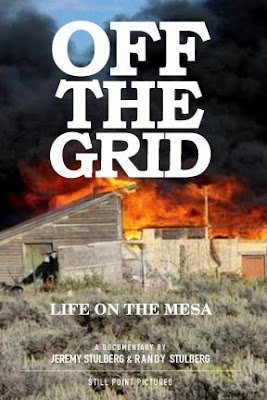
OFF THE GRID: LIFE ON THE MESA (Jeremy & Randy Stulberg, US, 2007, 64 m.). [NOTE: I missed the first 10 minutes of this screening; I saw the last 54 minutes (85%), enough to justify grading the film, in my opinion.] THEMES: ALTERNATIVE LIVING FOR FORMER WAR COMBATANTS WITH PTSD, OTHERS WHO FEEL ALIENATED FROM THE LARGER SOCIETY. On a high plain in New Mexico, some of society's outsiders, mostly military combat veterans and their families, have been drawn to a loosely organized community to live off the grid and away from mainstream America, which they had found insufferable. The film consists largely of segments from interviews with a dozen or so citizens of this encampment (most people live in RVs, some in more permanent structures). Most of the vets – from Vietnam, the first Gulf War, and even a few from the Iraq War – profess intense loyalty to their country but feel that the U.S. culture has failed them.
.
American flags are very much in evidence. People home school their kids. One or more nurses tend to medical issues. Everybody is armed to the teeth. Shooting practice, rather than golf, is the most popular sport around. Some of the wives can’t stand living there, and long separations and divorces have resulted. Other families remain intact and seemingly the better for having moved to the high desert. There is a council of elders – we meet one of them, a white bearded, mandolin playing Vietnam vet – that deliberates on community problems that cannot be worked out among individuals. A pack of erstwhile homeless kids – the “Nowhere” group – moves into the area and begins to steal from others. The elders ponder what to do and decide to send in “the Mamas” – an ad hoc group of women of various ages and stations – to mediate matters. It works. The kids listen up and fly right in return for being allowed to stay on. The arrangement has now held up for a number of years.
.
American flags are very much in evidence. People home school their kids. One or more nurses tend to medical issues. Everybody is armed to the teeth. Shooting practice, rather than golf, is the most popular sport around. Some of the wives can’t stand living there, and long separations and divorces have resulted. Other families remain intact and seemingly the better for having moved to the high desert. There is a council of elders – we meet one of them, a white bearded, mandolin playing Vietnam vet – that deliberates on community problems that cannot be worked out among individuals. A pack of erstwhile homeless kids – the “Nowhere” group – moves into the area and begins to steal from others. The elders ponder what to do and decide to send in “the Mamas” – an ad hoc group of women of various ages and stations – to mediate matters. It works. The kids listen up and fly right in return for being allowed to stay on. The arrangement has now held up for a number of years.
.
The community and its citizens are presented in a sympathetic light. It is easy to admire these folks for minimizing their consumption of stuff (the money spent annually by the average family here is about $4 to $5 thousand, and many have government pensions that cover costs). The carbon footprints these people make are enviably tiny. Viewed from another perspective, however, the picture is less idyllic and more disturbing. For one thing, in most cases we taxpayers are subsidizing these folks, enabling them to live lives that center around idleness, music making, lots of pot smoking and booze guzzling, and gunslinging. Perhaps public support is a wise thing, though, when one ponders about how many of these men might have offed somebody by now, or themselves, had they remained in the mainstream. One elder had been educated at Exeter and Princeton. Isn’t his intellectual talent going to waste? Doesn’t the larger culture need the active participation of people who waste less, thus want less? Is it any of our damn business? Grade B (02/08)



No comments:
Post a Comment